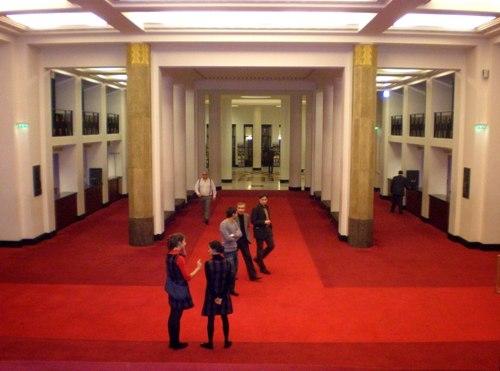Ninety-five per cent of Napoleon's army was wiped out on the freezing retreat from Moscow in 1812. The statistics weren't nearly as impressive nor, thankfully, so mortal for the Russian National Orchestra's concert in Paris's Salle Pleyel last Saturday. It happened under reduced circumstances that hardly affected the quality of the playing - though sadly nothing could be done about the wayward conducting of the controversial (though not, it seems, in France) Mikhail Pletnev.
That afternoon, a blizzard affected Paris with snowflakes the size of which I've never seen. Several of the lorries bringing the RNO's instruments, orchestral parts and concert garb were stuck on the Périphérique and refused admission to fortress Lutetia. Fortunately the players, their conductor and soloist Gidon Kremer were all ready and willing.
So an efficiency which sadly wasn't to stretch to Eurostar or the airlines swung into action. The Orchestre de Paris loaned the necessary instruments and dug into its library for whatever scores it had - bizarrely, not Shostakovich's Fifth, of all his symphonies, which had to be replaced by Tchaikovsky's, nor one of the three Dvořák Slavonic Dances on the programme (a blessed relief, given that Pletnev's conducting of what ought to be a total charmer was the most testudinal I've ever heard, and easily the worst musical performance of the year for me). But the Tchaikovsky Violin Concerto remained, the highlight of the evening given Kremer's nuanced and dynamic, if hardly charming, interpretation. And if the RNO has never risen to the standard of the world's great orchestras, it boasts a wonderful first oboist and the lower strings sounded gorgeous indeed in the clear acoustics of the relatively new Salle Pleyel auditorium.
The concert started more or less on time, with the bizarre spectacle of some players in jeans and jackets, others in the full black-and-white gear. And how one wanted to applaud them for the effort. But, phenomenal pianist though he is, Pletnev conducts even more glacially than ever. His Tchaikovsky Five started with lugubrious promise, but the first movement seemed interminably epic, the Andante Cantabile never truly flowed and the finale lacked all fire, in sad contrast with the deep-digging strings of Venezuela's Teresa Carreño Youth Orchestra earlier this year. An event, then, hardly on a par with all the stunning exhibitions around Paris to celebrate its big Russian year, now coming to a close. That it happened at all was no doubt the finest thing about it.
- More details on the Russia-France Year
- Check out the Salle Pleyel website for further concerts in the 2010-11 season













Add comment